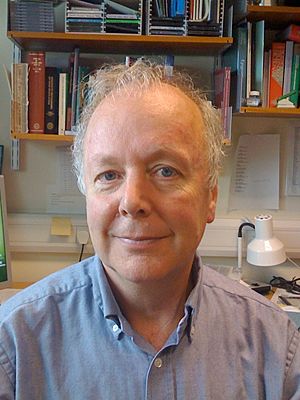Adrian Bird facts for kids
Quick facts for kids
Sir Adrian Bird
|
|
|---|---|
 |
|
| Born |
Adrian Peter Bird
3 July 1947 Rowley Regis, Staffordshire, England
|
| Alma mater |
|
| Spouse(s) |
Catherine Mary Abbott
(m. 1993) |
| Awards |
|
| Scientific career | |
| Fields |
|
| Institutions |
|
| Thesis | The cytology and biochemistry of DNA amplification in the ovary of Xenopus laevis (1972) |
| Doctoral advisor | Max Birnstiel |
| Doctoral students | Rob Klose |
Sir Adrian Peter Bird (born 3 July 1947) is a famous British geneticist. He is a professor of genetics at the University of Edinburgh. Sir Adrian has spent most of his career in Edinburgh. He earned his PhD there in 1970. Later, he directed the Wellcome Trust Centre for Cell Biology. His research helps us understand DNA methylation. This is how DNA is controlled in our bodies. He also studies CpG islands and their role in diseases like Rett syndrome.
Contents
Early Life and Education
Adrian Bird was born in Rowley Regis, England. When he was four, his family moved to Kidderminster. He went to a grammar school in Hartlebury. There, he enjoyed playing cricket and hockey.
He studied Biochemistry at the University of Sussex. Then, he earned his PhD from the University of Edinburgh in 1970. His research was guided by Max Birnstiel.
Career and Important Discoveries
After his PhD, Sir Adrian worked as a researcher at Yale University. He also worked at the University of Zurich. In 1975, he returned to Edinburgh. He joined the MRC Mammalian Genome Unit. He stayed there for 11 years.
While at the MRC, he made an important discovery. He worked with Edwin Southern. They mapped how DNA is controlled in the African clawed frog. From 1987 to 1990, he continued his research in Vienna.
In 1990, Adrian Bird became a professor at the University of Edinburgh. He helped create the Wellcome Trust Centre for Cell Biology. He was its director from 1999 to 2011. He also served on the board of the Wellcome Trust.
Sir Adrian is also involved with charities. He is a trustee for Cancer Research UK. He also supports the Rett Syndrome Research Trust. He helps guide the Edinburgh Cancer Research Centre.
Understanding DNA Control
Sir Adrian's research focuses on special parts of DNA called CpG islands. He also studies a protein called MeCP2. His team was the first to find CpG islands. These are short areas in our DNA. They have many "CpG dinucleotides." These areas are often "unmethylated." This means they are ready for genes to be active.
His group found that the MeCP2 protein attaches to "methylated" CpG sites. This is like a switch that turns genes on or off. They also discovered something very important. If this MeCP2 protein doesn't work right, it can cause Rett syndrome. Rett syndrome is a brain disorder. It affects how people develop and communicate.
In 2007, Sir Adrian's lab published exciting news. They showed that Rett syndrome could be reversed in mice. They did this by putting a working MeCP2 gene back into the mice. This worked even when the mice had severe symptoms. This discovery gives hope for future treatments. It suggests that gene therapy might help people with Rett syndrome one day.
Awards and Recognition
Sir Adrian Bird has received many awards for his scientific work.
- In 1989, he became a Fellow of the Royal Society (FRS). This is a great honor for scientists.
- He received the Gabor Medal in 1999. This was for his work on how genes are controlled.
- He also won the Louis-Jeantet Prize for Medicine in the same year.
- In 2005, he was made a Commander of the Order of the British Empire (CBE).
- In 2011, he received the Gairdner Foundation International Award. This was for his discoveries about DNA methylation.
- He won the GlaxoSmithKline Prize in 2012.
- In 2013, he received the BBVA Foundation Frontiers of Knowledge Award. This was for his work in epigenetics. Epigenetics is about how genes are controlled without changing the DNA itself.
- He was knighted in 2014 for his services to science. This means he is now called "Sir Adrian."
- In 2016, he received the Shaw Prize in Life Science and Medicine.
- He was awarded the Buchanan Medal of the Royal Society in 2018. This was for his medical discoveries.
- In 2020, he received The Brain Prize. This award recognizes outstanding research on the brain.
Personal Life
Adrian Bird is married to Cathy Abbott. She is also a geneticist. They have four children. Sir Adrian has said he plans to keep working as long as his research group is funded and their work is published.
 | Georgia Louise Harris Brown |
 | Julian Abele |
 | Norma Merrick Sklarek |
 | William Sidney Pittman |

